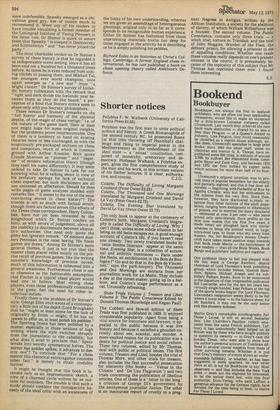Shorter notices
Polybius F. W. Walbank (University of California Press £4.05)
Polybius was the first man to unite political science and history. A Greek Romanophile of the second century BC, he presented Rome (at that time throwing off Hannibal's challenge and rising to imperial power in the Mediterranean) as the embodiment of the ideal state — a ' mixed ' constitution, composed of monarchy, aristocracy and democracy. Professor Walbank, a Polybius expert, gives the first comprehensive study of the man and his work, in this written version of his Sather lectures. It is clear, authorita
tive, and concise. C.J.G.
Colette, The Difficulty of Loving Margaret Crosland (Peter Owen £3.25) Colette, The Thousand and One Mornings translated by Margaret Crosland and David Le Vay (Peter Owen £2.75) Colette, The Evening Star translated by David Le Vay (Peter Owen £2.75) The only book to appear at the centenary of Colette's birth, Margaret Crosland's biography is called The Difficulty of Loving. Why I can't think, unless some subtle allusion to her being an old leslie escapes me. A good enough account of Colette's life, if you haven't read one already. Two newly translated books by ' cette femme litteraire ' appear at the same time. Evening Star, is a collection of autumnal and arthritic reminisces — Paris under the Nazis, an exhibitionist in the Bois de Boulogne (" Go and do that in the Bois de Vincennes," says the park-keeper). The Thousand and One Mornings are extracts from her' journalistic work for Le Matin. They include a day at the corset-maker, going up in a balloon, and Colette's stage performance as a cat. Unusually refreshing.
State Trials Volume I: Treason and Libel; Volume 2: The Public Conscience Edited by Donald Thomas (Routledge and Kegan Paul)
The Cobbett and Howell edition of State Trials was first published in 1809. It enjoyed considerable popularity. Apart from being a vital source for historians and lawyers, it appealed to the public because it was live history and because it satisfied a ghoulish curiosity about sex, scandal, and murder. A more exalted reason for its publication was a desire for political justice and social reform. These two volumes, edited by Mr Thomas, deal with public or political issues. The first volume, Treason and Libel, besides the trial of Thomas More, and other trials for treason, also includes the first successful prosecution for obscenity (the books — 'Venus in the Cloister' and 'De Usu Flagrorum ') and two trials concerning the publication of libellous articles. One of these is a 'letter to the king' a criticism of George Ill's government by the anonymous journalist Junius. The other is an inaccurate report of cruelty to a preg nant Negress in Antigua, written by the African Institution, a society for the abolition of slavery, of which William Wilberforce was a founder. The second volume, The Public Conscience, contains only three trials — a witch trial; torture in Trinidad; and the trial of John Huggins, Warden of the Fleet, the debtors' prison, for allowing a prisoner to die of appalling conditions. Whether one reads these volumes really depends on one's present interest in the courts; it is presumably because of the topicality of this subject that Mr Thomas has reprinted them now. I found them interesting.
E.S.


































 Previous page
Previous page